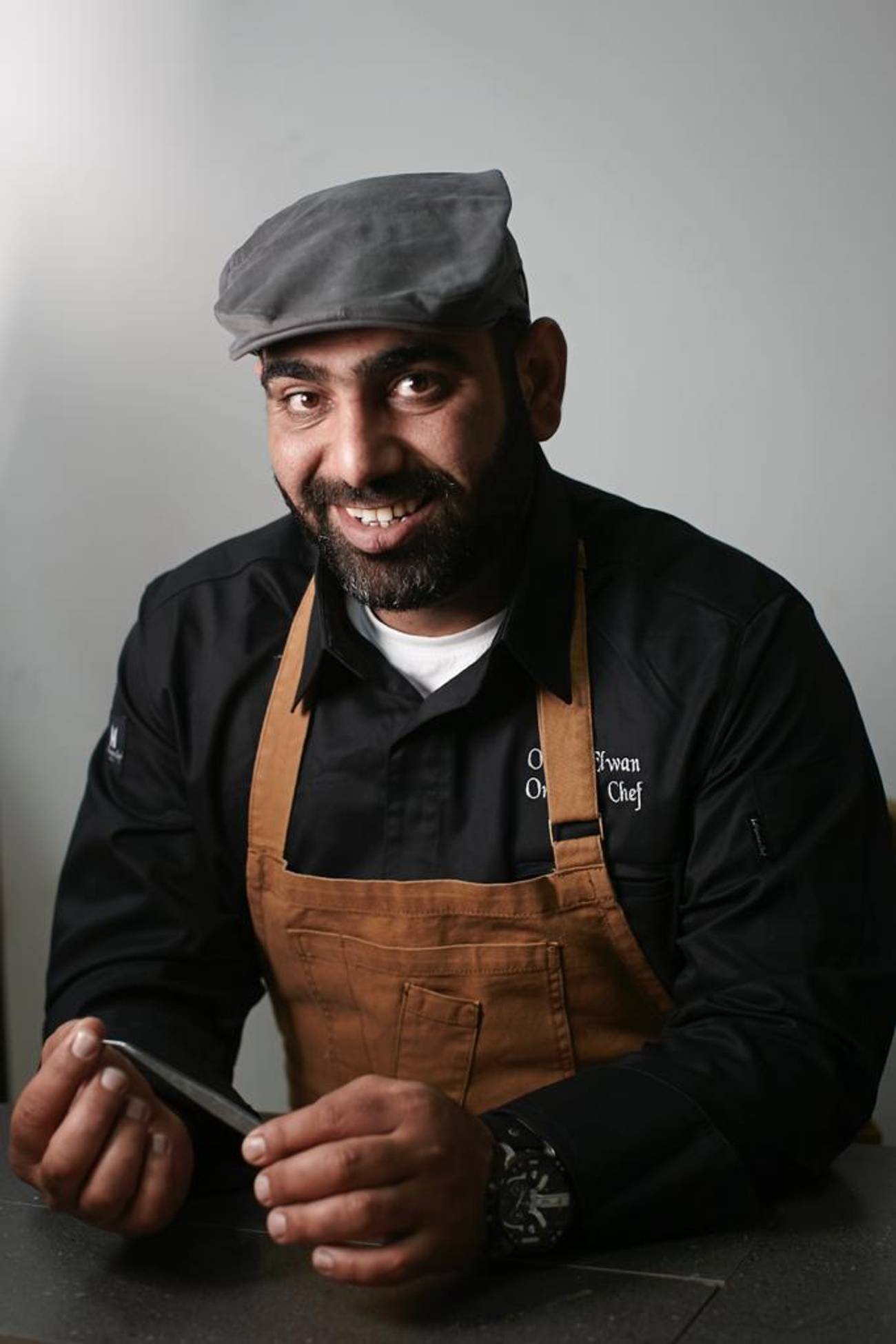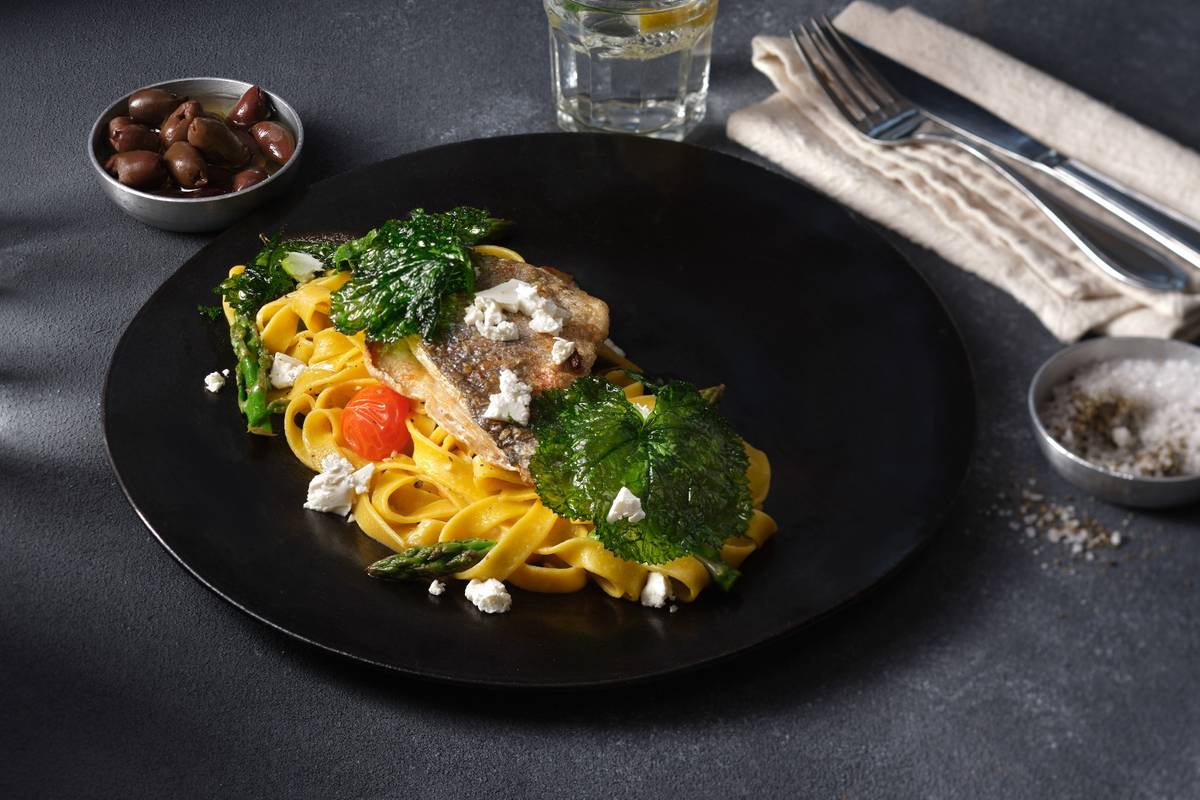When Shawarma Meets Focaccia, and Pizza Mixes With Lahmajoun
Israeli Arab restaurants are bringing Italian flavors to traditional recipes, and winning over diners with their innovative combinations




Between Netanya and Haifa, if you drive inland, Routes 6 and 65 outline a triangle of tightly packed, Hebrew-speaking towns and moshavim, as well as several Israeli Arab villages—one of which, Ar’ara, is home to a small culinary gem: Mijana, a restaurant where classic Arab dishes meet Italian flavors. On the menu, diners can find polenta enriched by spiced chicory, risotto with locally hand-picked mallow, and arancini made with freekeh (roasted wheat, which is incredibly popular in Arab kitchens). As curious as the combination sounds, Mijana isn’t alone. All over the country, Israeli Arab chefs have been embracing—and experimenting with—Italian influences.
It makes sense, in more ways than one. It’s no secret that the powerhouses of Italian cuisine—pasta and pizza—are intensely beloved and easily lend themselves to cross-pollinations. Case in point is the successful California-based franchise Curry Pizza House, or the fact many fine-dining chefs in the U.S. are starting to get playful with pastas. For Israeli Arab chefs, Italian food represents an opportunity to exercise creativity that’s also historically sound and financially bulletproof.
The seemingly surprising marriage of marinara and harissa can take many shapes, from fast-casual and casual pizzerias and bakeries to elegant restaurants. Mijana walks a fine line between the two, and Omar Elwan, its consulting chef, has been making a solid career out of this culinary direction for the past few years. “The first reaction is oftentimes shock,” he said, describing the process of suggesting an Italian twist to his clients: Israeli Arab restaurant owners, chefs, and entrepreneurs. “But then, when they try it and taste it, they see it works!”
Elwan, who also consults to other Arab Italian businesses like Il Forno in Kfar Manda in the lower Galilee and Zest in Haifa, has been on a mission to elevate the cuisine he’s grown up on, particularly the Syrian-Halabi recipes his grandma used to cook. Looking toward Italy is currently a highly successful strategy to do just that—now. A decade ago, his Haifa restaurant Alei Gefen (“grape leaves” in Hebrew) “was ahead of its time,” Elwan said, for its sophisticated aspirations. Now, energized by Israel’s appetite for culinary TV shows featuring Israeli Arab participants, he’s lending his expertise to other businesses, determined to set the bar high with unusual dishes like labneh panna cotta and fettuccine with shanklish (a Lebanese spiced cheese).
In Tel Aviv, Juvani, an Arabic-Mediterranean restaurant that riffs on Italian classics, is doing the same. The owners, brothers Marwan and Fadi Saman, were born in Rome to Israeli Arab parents who lived and worked in Italy at the time; they returned to Israel, to their father’s native village of Eilabun, in 2002. Their career as business owners had started with the purchase of the first Juvani restaurant, in their hometown, after years of working in the food industry while the two were students. Their desire was to have a fully Italian restaurant that reimagines the flavors of their unusual childhood, but, Fadi said, “in the village, it was difficult to bring just Italian food to our sector, so we opened a Middle Eastern restaurant with Italian touches.”
After the pandemic, at their second location, close to Tel Aviv University, the brothers decided to take things one step further. At the Tel Aviv Juvani, the bold friendship between Italian and Arab flavors thrives in dishes like the shawarma focaccia and pizza topped with ground beef and pine nuts—a topping typical of lahmajoun, a flatbread popular in Turkey, Syria, and Lebanon. For the brothers, focusing on Italian speaks to their upbringing, but their chosen direction works even outside of its unique context, and has turned out to be a part of a major trend. “These are two cuisines that share a lot of ingredients,” said Fadi. “Both focus on rice, meat, dough, and vegetables such as tomatoes.”

Pizza has been especially effective in bringing the Arab Italian concept to the Israeli masses. The recently opened Pala Trattoria in the Druze village of Yarka, and a bistro named Toti in Daburiyya, a town close to Nazareth, both offer creative spins on pizza. At Toti, chef Hamui Ibrahim uses Italian pizza dough baked in the taboon as a base for traditional Arab baked goods, such as sfiha and mukaskah, and piles labneh and za’atar on pizzas. There’s even a chicken-and-tomato-topped pizza, which is an homage to manakish, a traditional Arab dish of dough, ground meat, and herbs.
On the other end of the spectrum, Israeli Arab chefs who have risen to prominence in fine dining are embracing the connection, too. In Haifa, the northern city slowly climbing up the Israeli culinary influence pyramid, Eataliano Dalla Costa and Crudo, two eateries showcasing elegant plating and atmosphere, are playing around with Italian flavors, from freekeh arancini and fettuccine served with a lemon-and-harissa-flavored fish skewer, to a “Sicilian chraime,” a Levantine spicy fish stew done with Italian touches.
“The cuisines are very much alike, and, of course, Italian cuisine isn’t just plain Italian—if we’re talking about Sicily, it’s been under Islamic law for a significant amount of time,” Elwan said. “Our shishbarak resembles ravioli and tortellini, and arancini is akin to kubeh with rice—these references allow for play and experimentation.” What it also does is put Arab-owned restaurants on the map in a new way, for all Israelis.
For Israeli Arab diners, the wave of Arab Italian restaurants caters to newly minted adventurous eaters who are eager to try new things. “There’s definitely more curiosity in the sector,” said Fadi Saman. “People are starting to open up their minds to more special dishes beyond skewers and hummus.”
Elwan notes that Israeli Arab chefs, too, are increasingly motivated by innovation and challenges. “Yesterday I tried, with one of the chefs I consult, a risotto with burnt eggplant cream with brulee, goat cheese, and smoked eggplant jam. It sounds insane, but it was so good,” he said.
For Hebrew-speaking Israelis, the trend has been creating a dynamic draw to Israeli Arab towns previously left off the local culinary tourism map. Il Forno, Mijana, and Toti have received, soon after opening, generous coverage in the mainstream Israeli media, including television segments and food-related podcasts, which isn’t always the case with traditional Arab restaurants. Everyone loves an unlikely combination, and this one succeeds at feeling both intriguing and crowd-pleasingly familiar.
Flora Tsapovsky is a San Francisco-based food and culture writer.